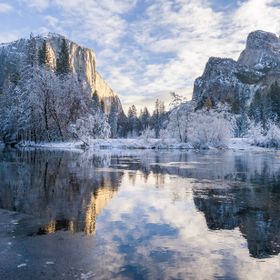zachwillsphotography
FollowWhile waiting for the sky to grow darker, I decided to take a 16-minute exposure. That was a terrible decision. I mean, there are worse places to kill 16 minute...
Read more
While waiting for the sky to grow darker, I decided to take a 16-minute exposure. That was a terrible decision. I mean, there are worse places to kill 16 minutes, but still...this was my first "normal" exposure after that. Can you feel the sense of relief oozing through?
Read less
Read less
Views
272
Likes
Awards
Summer Selection
Peer Award
Superb Composition
Absolute Masterpiece
Superior Skill
Top Choice
All Star
Outstanding Creativity
Magnificent Capture
Categories
Same photographer See allBehind The Lens
Discover more photos See all
Behind The Lens
Location
I took this particular photo at Bear Lake in Rocky Mountain National Park. I needed to get far enough from city lights to get a clear view of the stars, so Rocky Mountain National Park made sense. And Bear Lake requires little to no hiking in the dark to reach vantage points like this one. It was one of my first trips into the park, and thanks to this view, it certainly has been one of the most memorable.Time
To capture the Milky Way at its brightest, I waited until astronomical twilight ended around 10:40pm. I had arrived a little before 10pm, but thankfully my wife kept me company (and sane) while I waited for the sky to darken. You can capture some beautiful blues in the sky during astronomical twilight, but the starts will be clearest after it ends.Lighting
On this night, the stars were bright enough to see the Milky Way with your naked eye. Several planets were also visible, and as the wind swept across the lake, you could watch their reflections stretch and fade across the surface.Equipment
I shot this with my Nikon D700 and 14-24mm f/2.8 lens. I also used a Feisol tripod and cable release.Inspiration
I had recently moved to Colorado and was excited about getting some clear night skies over the mountains. I haven't done a lot of night photography, but every time I do, I leave in awe of the beauty of the stars. I wanted a location with dark enough skies and an interesting foreground. I love how stars look over bodies of water, so a lake made sense. And since it was close to the new moon and I would be hiking in the dark, I looked for options with little to no hiking required. Bear Lake fit the bill perfectly.Editing
Actually, this shot is probably one of the most technical images I've created. With night photography, you usually have to combine long exposures (20-30 seconds) with higher ISOs (2500-6400), and that can introduce a lot of noise into your images. I was watching some YouTube tutorials about night photography to get inspired, and I came across one where the photographer took 8 consecutive exposures and manually aligned them in Photoshop as a means to reduce the amount of noise in the image. It takes a lot of time and manual work in Photoshop to align the images, and I'm not sure it's worth it. Still, I'm happy with the result.In my camera bag
My bag is a mix of the essentials (camera, lenses, batteries, etc.) and a random and ever-growing assortment of "precautions." Tools for my tripod, gloves, headlamps, bug spray, and snacks all litter the pockets and lower reaches of my bag. But they also provide some nice cushioning for my Nikon D700 and 14-24, 24-70, and 70-200mm lenses ;)Feedback
Start with a good dark sky map. There are several free ones and they are indispensable when it comes to finding a good night sky. Then, check the moon phase. If you're after the Milky Way, try to time it so that 40% or less is visible. Or go out before/after the moon rises/sets. The moon does a good job of lighting your landscape, but it also washes out the stars. Also, think wide. A wide angle lens will let you take slightly longer exposures before the stars turn into star trails. And finally, don't trust your LCD screen completely. It's the only light source for miles and can make an otherwise underexposed scene look bright, so rely on your histogram (that rollercoaster-looking thing that occasionally pops up). It will tell you how dark your exposure is.






































